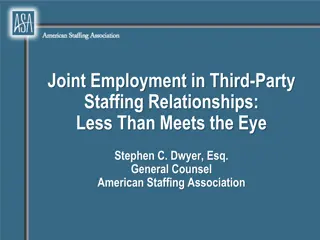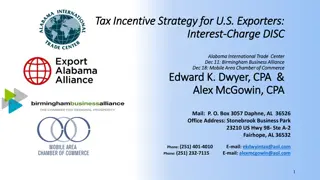
Brexit Impact on UK and Irish Agriculture Sector
Explore the key issues facing the agriculture sector in the UK and Ireland post-Brexit, including implications for cross-border trade, exchange rate volatility, future trading relationships, and more. Discover the challenges and potential solutions facing the agriculture and agri-food industries in both countries.
Download Presentation

Please find below an Image/Link to download the presentation.
The content on the website is provided AS IS for your information and personal use only. It may not be sold, licensed, or shared on other websites without obtaining consent from the author. If you encounter any issues during the download, it is possible that the publisher has removed the file from their server.
You are allowed to download the files provided on this website for personal or commercial use, subject to the condition that they are used lawfully. All files are the property of their respective owners.
The content on the website is provided AS IS for your information and personal use only. It may not be sold, licensed, or shared on other websites without obtaining consent from the author.
E N D
Presentation Transcript
1 BREXIT Key issues for the agriculture sector Rowena Dwyer IFA Chief Economist 22ndSeptember 2016
2 Topics UK and Irish agriculture a special relationship Focus on Cross-border trade The key issues Short term - Exchange rate volatility Future trading relationship The EU Budget Agricultural Support once outside the EU? Other Issues Conclusion
The Irish Agri-food sector A special trading relationship with the UK While diversification into new markets is occurring 1973 70% of all food exports to UK 2015 41% to UK Still a hugely important trading partner Beef exports 1.1b (50%) to UK market Dairy exports - 1b (1/3) to UK market Pigmeat exports - 350m (60%) to UK Mushrooms ~ 120m UK the only large scale Irish export market
4 Focus on Cross-border trade Significant cross border trade annually Animals and animal products for further processing 350,000 live sheep imports to ROI 500,000 pigs exported to NI Over 500m litres of milk from NI processed in ROI Value of agri-food trade H1 2016 Exports to Northern Ireland - 250m 75m meat exports (vs 25m meat imports) Imports from Northern Ireland - 200m 75m dairy imports (vs 25m dairy exports from ROI)
5 Short-term issues Exchange rate volatility Pound has weakened from 0.76: 1 to reach 0.86: 1 Positive for Northern Irish exports into Ireland and the EU Negative impact on competitiveness for Irish agricultural exports to UK Irish exports to UK down 7.5% in July 2016 v July 2015 IFA has identified practical steps to mitigate income/competitiveness effects Provide increased funding for farm schemes in October s budget - already agreed as part of Ireland s Rural Development programme. Taxation measures - Assist with cost competitiveness in Budget Increased promotion of Irish produce in the UK and overseas and a strengthened Department of Agriculture market access unit
6 Longer Term - Future trading relationship Unknown no discussions have started Currently, outside of the Single Market, all trade agreements have tariff barriers for agricultural goods IFA position Imposition of barriers to trade would all add to costs and undermine the competitiveness of our agri-food exports. Hugely important for agriculture and agri-food sector that as free as possible market access to the UK is maintained Another risk 3rd country trade deals with the UK Displacement of Irish/ Northern Irish product on UK market UK cannot legally negotiate bilateral deals until such time as it is no longer a member of the EU Agricultural trade deal with a third country can only be in the context of an overall Regional Trade Agreement must cover substantially all trade
7 Longer term - Impact on EU Budget Current situation UK a net contributor -~ 10-11b Reduced EU Budget increased contributions from Member States? Future situation Unknown - under new relationship - UK may have to continue making a contribution? Some clarity Member State CAP funding to 2020 is set out in EU Regulations would have to be changed by agreement of EU Commission/Council /Parliament IFA Position post 2020: Ireland is a net contributor to the EU budget it is in Ireland s strategic interest that there is a strong CAP budget post 2020
8 Longer Term Agricultural Support outside the EU Direct EU payments represent 87% of annual farm income for Northern Irish Farmers Future Agricultural Support Philip Hammond - current level of agricultural funding under CAP Pillar 1 will be upheld until 2020, as part of the transition to new domestic arrangements. No certainty after that point
9 NFU study on potential BREXIT impact Study modelled the impact of changes in agricultural supports and trading relationships on farm incomes and viability Trading relationship Full trade liberalisation would have a negative impact on domestic prices for meat, some dairy and knock-on impact on feed prices A less open trade relationship (WTO tariffs, Free Trade Agreements) would increase cost of imports into UK and increase domestic prices Agricultural supports A significant reduction in direct supports would offset any price increase in different trading scenarios Reduction in income and farm viability across many sectors Particularly vulnerable are the cattle and sheep sectors, mixed livestock and tillage (similar dependence on direct payments in Ireland) British Agriculture: The implications of a UK exit from the EU May 2016
10 Other Issues Animal Health Shared land border Changes to trading relationship new agreements required on animal movements, health certificates etc? Coherence in regulations and standards critical Processing and labelling of EU/Non-EU ingredients Cross Border Farms Basic Payment Entitlements other farm schemes Cross-border movement of goods, services and people Barriers must be minimised
11 Conclusion Huge number of issues Greater political certainty is vital - Economic issues will then work their way through. Focus must be on: Implementing measures to tackle short-term impact of exchange rate volatility Keeping the future trading relationship and certainty on the EU budget to the top of the Government and broader EU policy agenda.





















